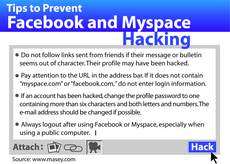Two or three students report being the victim of cyber stalking or restraining order violations through social networking Web sites, e-mail or cell phones each semester according to University Police. Craig Jaccuzzo, director of University Police, said cyber stalking, repeated harassment through an electronic device, is not new to Nicholls, citing the Facebook threats sent to students on campus after last year’s presidential election as an example.
Jaccuzzo said the punishment for cyber stalking can range from six months in prison for a misdemeanor to five years if the case gets to the federal level. “It depends on the level of misuse of the computer.” Cyber stalking is often accompanied by restraining order violations, which forbid any form of contact with certain individuals.
Jaccuzzo said cyber stalking is usually the result of a relationship or competition gone bad and that students often hand out private information over the Internet through Web sites like Facebook and Myspace. “It’s usually a person closest to you,” Jaccuzzo said.
University Police tries to locate cyber stalkers with the assistance of the stalkers’ Web service or phone service providers to get search warrants, but also offers advice on how to prevent stalking and hacking, such as always using familiar Web sites and backing up computers with spyware and a firewall. Jaccuzzo said students should also think about the information they pass on about others as they could become liable for defamation and slander.
“You should treat e-mail and Facebook addresses as private as you would phone numbers,” Jaccuzzo said. He advises students to use caution when sending personal information and photos through the Internet because they can be instantly exposed to the world. “Students don’t respect the information highway; they respect their access to it.”
Jaccuzzo also cautions students to use discretion when posting information on the Internet because prospective employers often perform background searches on applicants. “If they see you acting inappropriately, you think they will want to hire you?” Jaccuzzo said.
Kristie Goulas, director of career services, said employers not only search for information on prospective employees but current employees as well. “Nowadays, so many people have Facebook and Myspace, it’s a natural habit to Google them,” Goulas said. “An employer is looking to see if you can handle yourself in an adult fashion. They’re looking for trust and responsibility.”
Goulas said people should be aware of how they are viewed through social networking Web sites. “We not only represent ourselves in the world but our company, franchise or name brand.”
Goulas said people should be aware of how others will view information and photos on their profiles. “Think about if your grandmother would see your pictures and be okay with them or your explanations for them,” she said. “Think of your boss in the same manner.”
However, people should not rule out social networking Web sites all together, Goulas said. “You never know in a professional setting how a relationship can help you get a job, keep a job or make a business deal work.” Goulas uses Facebook but maintains private settings and does not allow people to tag her in photos. She said it is also important to have a professional e-mail address. “No one should have ‘sexycajun’ or ‘buffdude’ as their address,” Goulas said. Instead, an e-mail address should only consist of the user’s name. “You want employers to remember who you are,” Goulas said.








